Published on: December 17, 2024, 10:04h.
Last updated on: December 17, 2024, 10:18h.
South Carolina’s upcoming 2025 legislative session will see the introduction of a sports betting bill by one lawmaker, marking the fourth such attempt in the state.

Republican Representative Chris Murphy of Dorchester County has introduced House Bill 3625 (HB 3625), also known as the South Carolina Wagering Act. This bill aims to establish a regulated sports betting market in a state traditionally resistant to gaming expansion.
One unique aspect of Murphy’s proposal is that it sets the minimum age for sports betting in South Carolina at 18 years old, disallowing minors from placing wagers. Only Kentucky, New Hampshire, Washington DC, and Wyoming currently allow 18-year-olds to participate in sports betting among the 39 jurisdictions that permit it in the US.
‘Sports wagering’ means the business of accepting wagers on sporting events or portions of sporting events, the individual performance statistics of individuals in sporting events, or a combination of any of the same by any system or method of wagering approved by the director via a mobile sports wagering licensee’s mobile applications and digital platforms that use communications technology to accept wagers,” according to Murphy’s proposal.
The bill would also legalize daily fantasy sports (DFS) in the state.
South Carolina’s Mixed Sports Betting History
Earlier attempts at passing sports betting legislation in South Carolina have not been successful. Murphy sponsored a sports betting bill earlier this year that did not progress. Two bills aiming to boost the state’s horse racing industry last year also failed to advance in the Senate without a vote.
Similar outcomes occurred with a 2022 sports betting bill, and Governor Henry McMaster (R-SC) opposes gambling expansion. However, Murphy’s latest proposal has bipartisan support.
There is optimism for the future of sports betting in South Carolina due to the revenue potential seen in neighboring North Carolina. Nevertheless, comparing the two states in terms of sports betting revenue may not be entirely equitable given the population discrepancy.
Details of the South Carolina Sports Betting Bill
Murphy’s bill calls for the establishment of the South Carolina Sports Wagering Commission as the regulatory body overseeing sports betting in the state. It also proposes a tax rate of 12.5%, which would be competitive compared to other states.
If HB 3625 becomes law, eight licensees will be permitted to operate in South Carolina, with the state lottery expected to be a major player as the state lacks casinos.
Despite its lack of casinos, South Carolina has a larger population than other states that have legalized mobile betting, such as Louisiana, Kentucky, Connecticut, Iowa, and Kansas.


